Legal and Professional Issues in Nursing
VerifiedAdded on 2023/04/20
|9
|2737
|273
AI Summary
This article discusses the legal and professional issues in nursing, focusing on a case study of misconduct by a nurse. It explores the consequences of such misconduct and examines the factors contributing to these incidents. The importance of following ethical and legal obligations in nursing practice is emphasized.
Contribute Materials
Your contribution can guide someone’s learning journey. Share your
documents today.
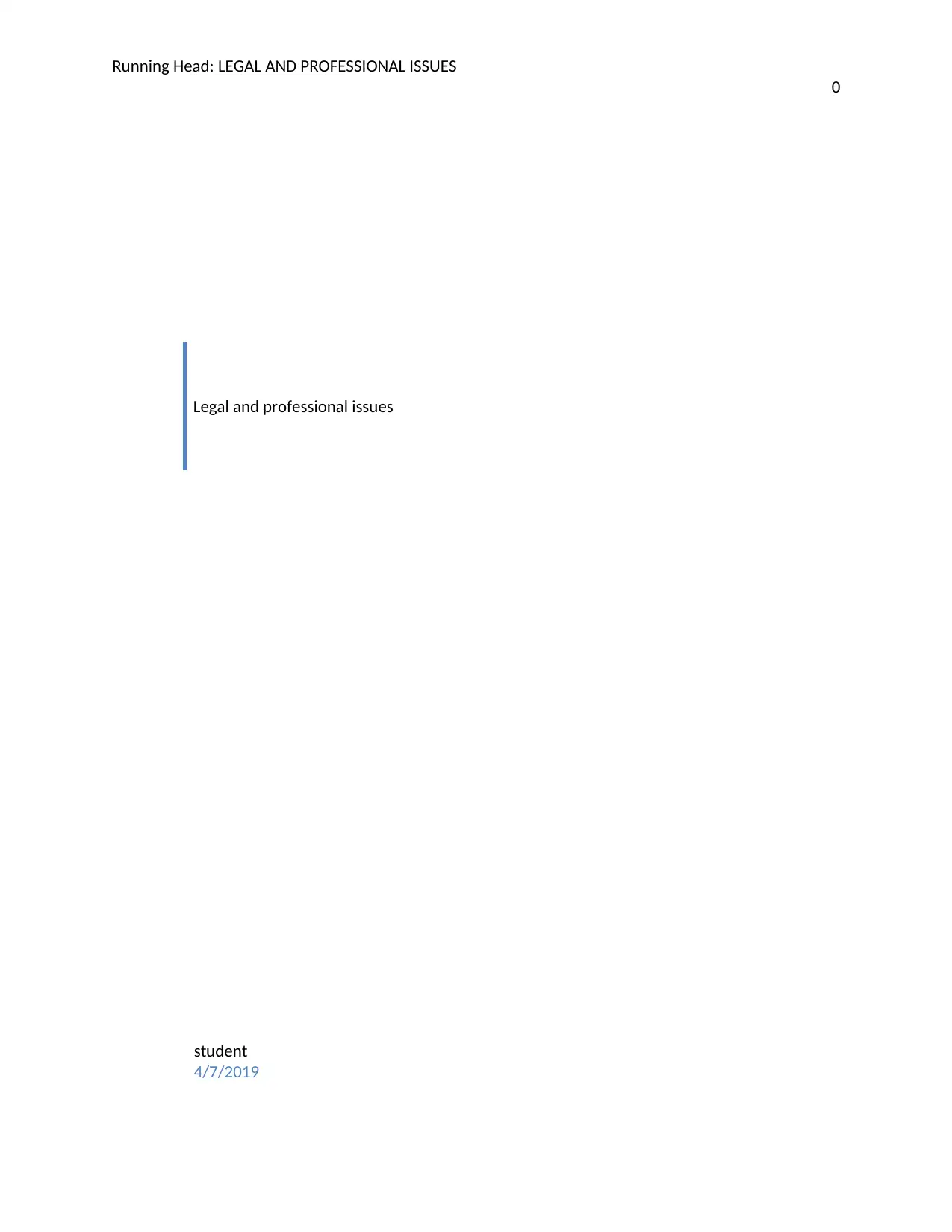
Running Head: LEGAL AND PROFESSIONAL ISSUES
0
Legal and professional issues
student
4/7/2019
0
Legal and professional issues
student
4/7/2019
Secure Best Marks with AI Grader
Need help grading? Try our AI Grader for instant feedback on your assignments.
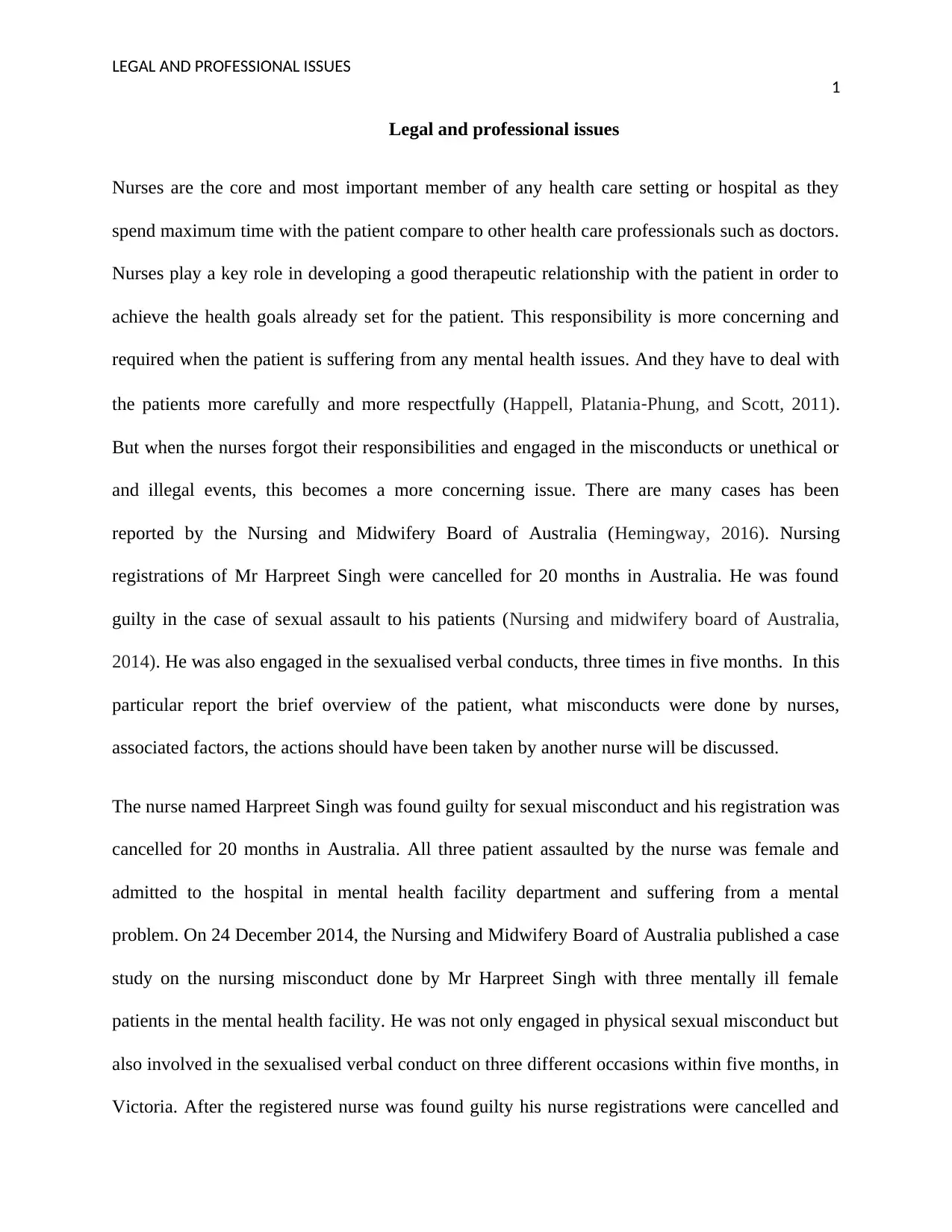
LEGAL AND PROFESSIONAL ISSUES
1
Legal and professional issues
Nurses are the core and most important member of any health care setting or hospital as they
spend maximum time with the patient compare to other health care professionals such as doctors.
Nurses play a key role in developing a good therapeutic relationship with the patient in order to
achieve the health goals already set for the patient. This responsibility is more concerning and
required when the patient is suffering from any mental health issues. And they have to deal with
the patients more carefully and more respectfully (Happell, Platania‐Phung, and Scott, 2011).
But when the nurses forgot their responsibilities and engaged in the misconducts or unethical or
and illegal events, this becomes a more concerning issue. There are many cases has been
reported by the Nursing and Midwifery Board of Australia (Hemingway, 2016). Nursing
registrations of Mr Harpreet Singh were cancelled for 20 months in Australia. He was found
guilty in the case of sexual assault to his patients (Nursing and midwifery board of Australia,
2014). He was also engaged in the sexualised verbal conducts, three times in five months. In this
particular report the brief overview of the patient, what misconducts were done by nurses,
associated factors, the actions should have been taken by another nurse will be discussed.
The nurse named Harpreet Singh was found guilty for sexual misconduct and his registration was
cancelled for 20 months in Australia. All three patient assaulted by the nurse was female and
admitted to the hospital in mental health facility department and suffering from a mental
problem. On 24 December 2014, the Nursing and Midwifery Board of Australia published a case
study on the nursing misconduct done by Mr Harpreet Singh with three mentally ill female
patients in the mental health facility. He was not only engaged in physical sexual misconduct but
also involved in the sexualised verbal conduct on three different occasions within five months, in
Victoria. After the registered nurse was found guilty his nurse registrations were cancelled and
1
Legal and professional issues
Nurses are the core and most important member of any health care setting or hospital as they
spend maximum time with the patient compare to other health care professionals such as doctors.
Nurses play a key role in developing a good therapeutic relationship with the patient in order to
achieve the health goals already set for the patient. This responsibility is more concerning and
required when the patient is suffering from any mental health issues. And they have to deal with
the patients more carefully and more respectfully (Happell, Platania‐Phung, and Scott, 2011).
But when the nurses forgot their responsibilities and engaged in the misconducts or unethical or
and illegal events, this becomes a more concerning issue. There are many cases has been
reported by the Nursing and Midwifery Board of Australia (Hemingway, 2016). Nursing
registrations of Mr Harpreet Singh were cancelled for 20 months in Australia. He was found
guilty in the case of sexual assault to his patients (Nursing and midwifery board of Australia,
2014). He was also engaged in the sexualised verbal conducts, three times in five months. In this
particular report the brief overview of the patient, what misconducts were done by nurses,
associated factors, the actions should have been taken by another nurse will be discussed.
The nurse named Harpreet Singh was found guilty for sexual misconduct and his registration was
cancelled for 20 months in Australia. All three patient assaulted by the nurse was female and
admitted to the hospital in mental health facility department and suffering from a mental
problem. On 24 December 2014, the Nursing and Midwifery Board of Australia published a case
study on the nursing misconduct done by Mr Harpreet Singh with three mentally ill female
patients in the mental health facility. He was not only engaged in physical sexual misconduct but
also involved in the sexualised verbal conduct on three different occasions within five months, in
Victoria. After the registered nurse was found guilty his nurse registrations were cancelled and
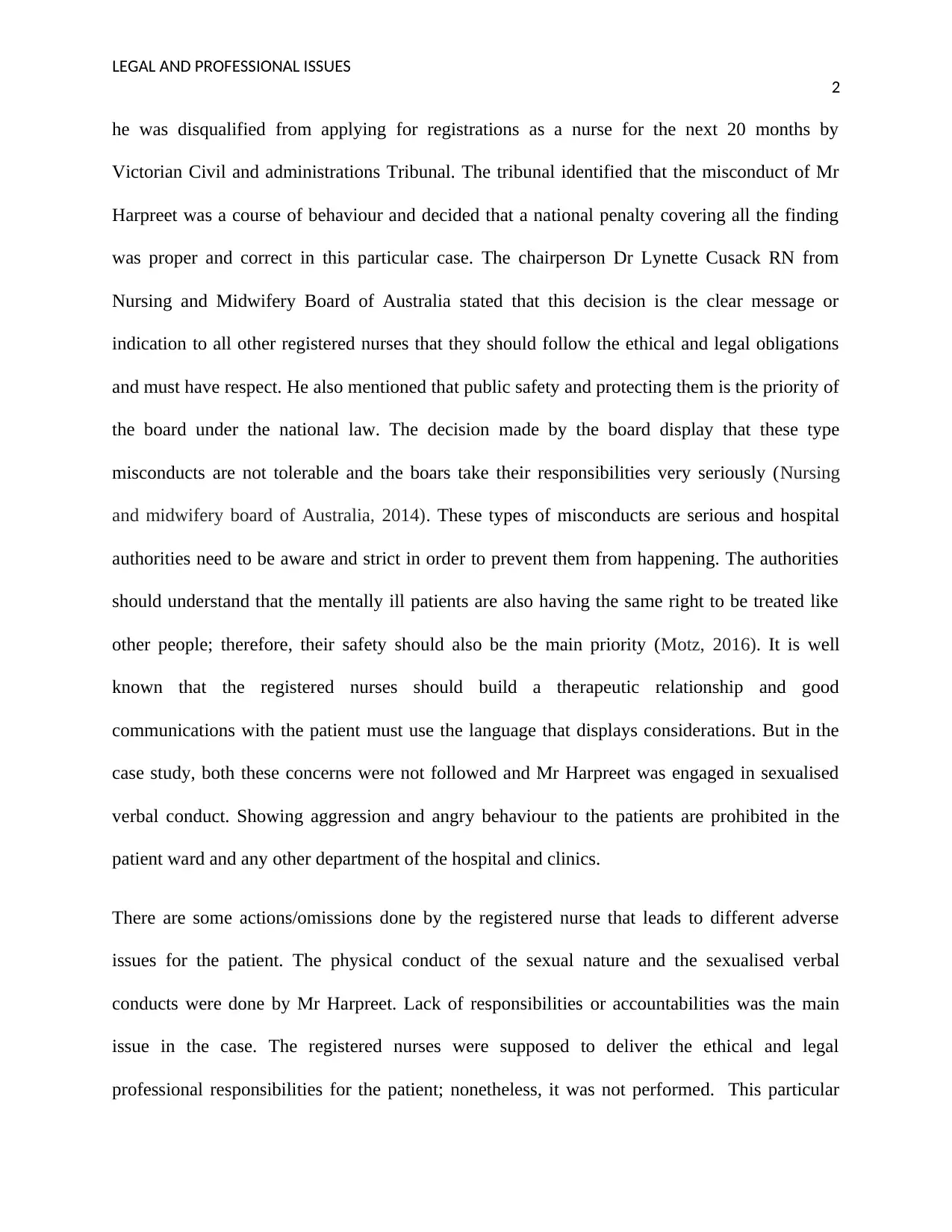
LEGAL AND PROFESSIONAL ISSUES
2
he was disqualified from applying for registrations as a nurse for the next 20 months by
Victorian Civil and administrations Tribunal. The tribunal identified that the misconduct of Mr
Harpreet was a course of behaviour and decided that a national penalty covering all the finding
was proper and correct in this particular case. The chairperson Dr Lynette Cusack RN from
Nursing and Midwifery Board of Australia stated that this decision is the clear message or
indication to all other registered nurses that they should follow the ethical and legal obligations
and must have respect. He also mentioned that public safety and protecting them is the priority of
the board under the national law. The decision made by the board display that these type
misconducts are not tolerable and the boars take their responsibilities very seriously (Nursing
and midwifery board of Australia, 2014). These types of misconducts are serious and hospital
authorities need to be aware and strict in order to prevent them from happening. The authorities
should understand that the mentally ill patients are also having the same right to be treated like
other people; therefore, their safety should also be the main priority (Motz, 2016). It is well
known that the registered nurses should build a therapeutic relationship and good
communications with the patient must use the language that displays considerations. But in the
case study, both these concerns were not followed and Mr Harpreet was engaged in sexualised
verbal conduct. Showing aggression and angry behaviour to the patients are prohibited in the
patient ward and any other department of the hospital and clinics.
There are some actions/omissions done by the registered nurse that leads to different adverse
issues for the patient. The physical conduct of the sexual nature and the sexualised verbal
conducts were done by Mr Harpreet. Lack of responsibilities or accountabilities was the main
issue in the case. The registered nurses were supposed to deliver the ethical and legal
professional responsibilities for the patient; nonetheless, it was not performed. This particular
2
he was disqualified from applying for registrations as a nurse for the next 20 months by
Victorian Civil and administrations Tribunal. The tribunal identified that the misconduct of Mr
Harpreet was a course of behaviour and decided that a national penalty covering all the finding
was proper and correct in this particular case. The chairperson Dr Lynette Cusack RN from
Nursing and Midwifery Board of Australia stated that this decision is the clear message or
indication to all other registered nurses that they should follow the ethical and legal obligations
and must have respect. He also mentioned that public safety and protecting them is the priority of
the board under the national law. The decision made by the board display that these type
misconducts are not tolerable and the boars take their responsibilities very seriously (Nursing
and midwifery board of Australia, 2014). These types of misconducts are serious and hospital
authorities need to be aware and strict in order to prevent them from happening. The authorities
should understand that the mentally ill patients are also having the same right to be treated like
other people; therefore, their safety should also be the main priority (Motz, 2016). It is well
known that the registered nurses should build a therapeutic relationship and good
communications with the patient must use the language that displays considerations. But in the
case study, both these concerns were not followed and Mr Harpreet was engaged in sexualised
verbal conduct. Showing aggression and angry behaviour to the patients are prohibited in the
patient ward and any other department of the hospital and clinics.
There are some actions/omissions done by the registered nurse that leads to different adverse
issues for the patient. The physical conduct of the sexual nature and the sexualised verbal
conducts were done by Mr Harpreet. Lack of responsibilities or accountabilities was the main
issue in the case. The registered nurses were supposed to deliver the ethical and legal
professional responsibilities for the patient; nonetheless, it was not performed. This particular
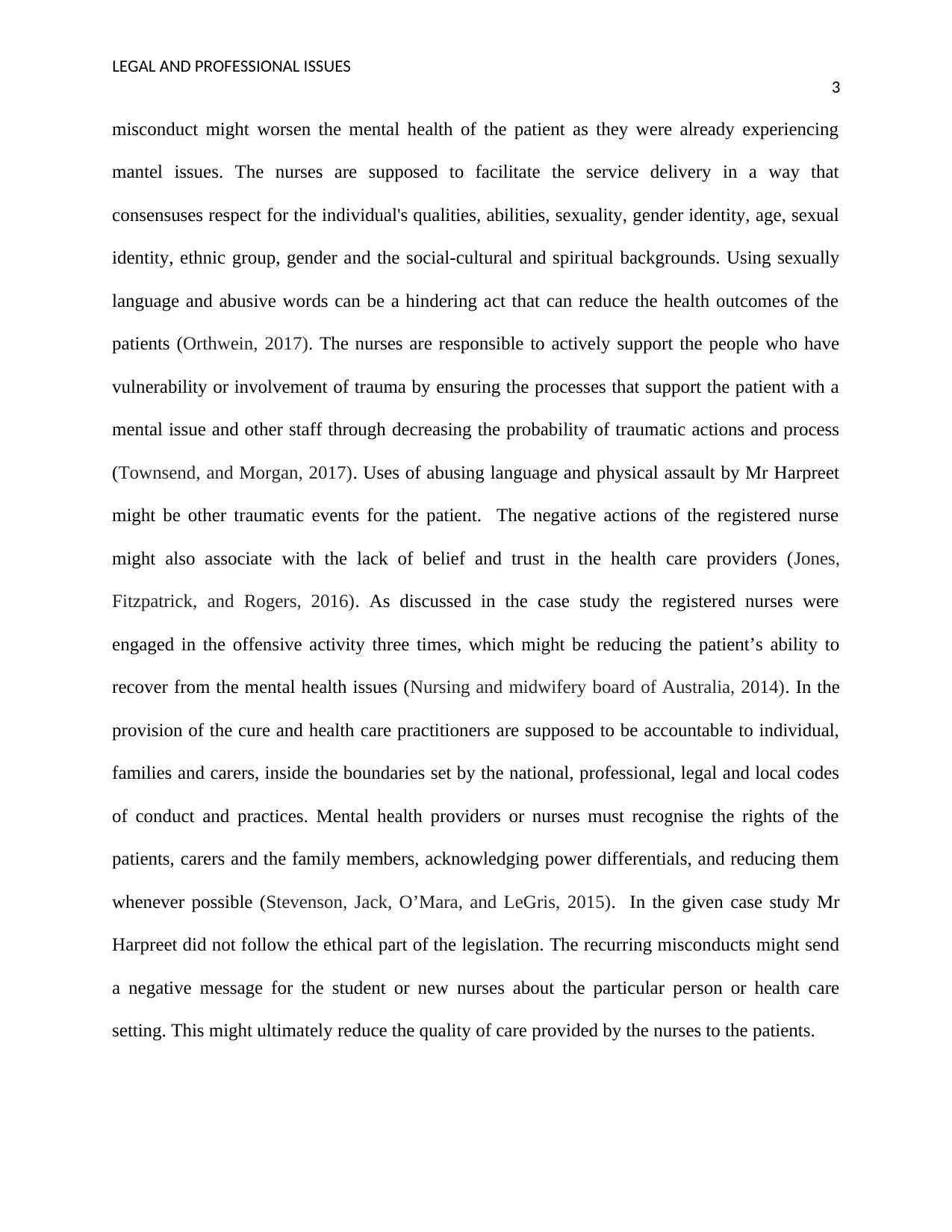
LEGAL AND PROFESSIONAL ISSUES
3
misconduct might worsen the mental health of the patient as they were already experiencing
mantel issues. The nurses are supposed to facilitate the service delivery in a way that
consensuses respect for the individual's qualities, abilities, sexuality, gender identity, age, sexual
identity, ethnic group, gender and the social-cultural and spiritual backgrounds. Using sexually
language and abusive words can be a hindering act that can reduce the health outcomes of the
patients (Orthwein, 2017). The nurses are responsible to actively support the people who have
vulnerability or involvement of trauma by ensuring the processes that support the patient with a
mental issue and other staff through decreasing the probability of traumatic actions and process
(Townsend, and Morgan, 2017). Uses of abusing language and physical assault by Mr Harpreet
might be other traumatic events for the patient. The negative actions of the registered nurse
might also associate with the lack of belief and trust in the health care providers (Jones,
Fitzpatrick, and Rogers, 2016). As discussed in the case study the registered nurses were
engaged in the offensive activity three times, which might be reducing the patient’s ability to
recover from the mental health issues (Nursing and midwifery board of Australia, 2014). In the
provision of the cure and health care practitioners are supposed to be accountable to individual,
families and carers, inside the boundaries set by the national, professional, legal and local codes
of conduct and practices. Mental health providers or nurses must recognise the rights of the
patients, carers and the family members, acknowledging power differentials, and reducing them
whenever possible (Stevenson, Jack, O’Mara, and LeGris, 2015). In the given case study Mr
Harpreet did not follow the ethical part of the legislation. The recurring misconducts might send
a negative message for the student or new nurses about the particular person or health care
setting. This might ultimately reduce the quality of care provided by the nurses to the patients.
3
misconduct might worsen the mental health of the patient as they were already experiencing
mantel issues. The nurses are supposed to facilitate the service delivery in a way that
consensuses respect for the individual's qualities, abilities, sexuality, gender identity, age, sexual
identity, ethnic group, gender and the social-cultural and spiritual backgrounds. Using sexually
language and abusive words can be a hindering act that can reduce the health outcomes of the
patients (Orthwein, 2017). The nurses are responsible to actively support the people who have
vulnerability or involvement of trauma by ensuring the processes that support the patient with a
mental issue and other staff through decreasing the probability of traumatic actions and process
(Townsend, and Morgan, 2017). Uses of abusing language and physical assault by Mr Harpreet
might be other traumatic events for the patient. The negative actions of the registered nurse
might also associate with the lack of belief and trust in the health care providers (Jones,
Fitzpatrick, and Rogers, 2016). As discussed in the case study the registered nurses were
engaged in the offensive activity three times, which might be reducing the patient’s ability to
recover from the mental health issues (Nursing and midwifery board of Australia, 2014). In the
provision of the cure and health care practitioners are supposed to be accountable to individual,
families and carers, inside the boundaries set by the national, professional, legal and local codes
of conduct and practices. Mental health providers or nurses must recognise the rights of the
patients, carers and the family members, acknowledging power differentials, and reducing them
whenever possible (Stevenson, Jack, O’Mara, and LeGris, 2015). In the given case study Mr
Harpreet did not follow the ethical part of the legislation. The recurring misconducts might send
a negative message for the student or new nurses about the particular person or health care
setting. This might ultimately reduce the quality of care provided by the nurses to the patients.
Secure Best Marks with AI Grader
Need help grading? Try our AI Grader for instant feedback on your assignments.
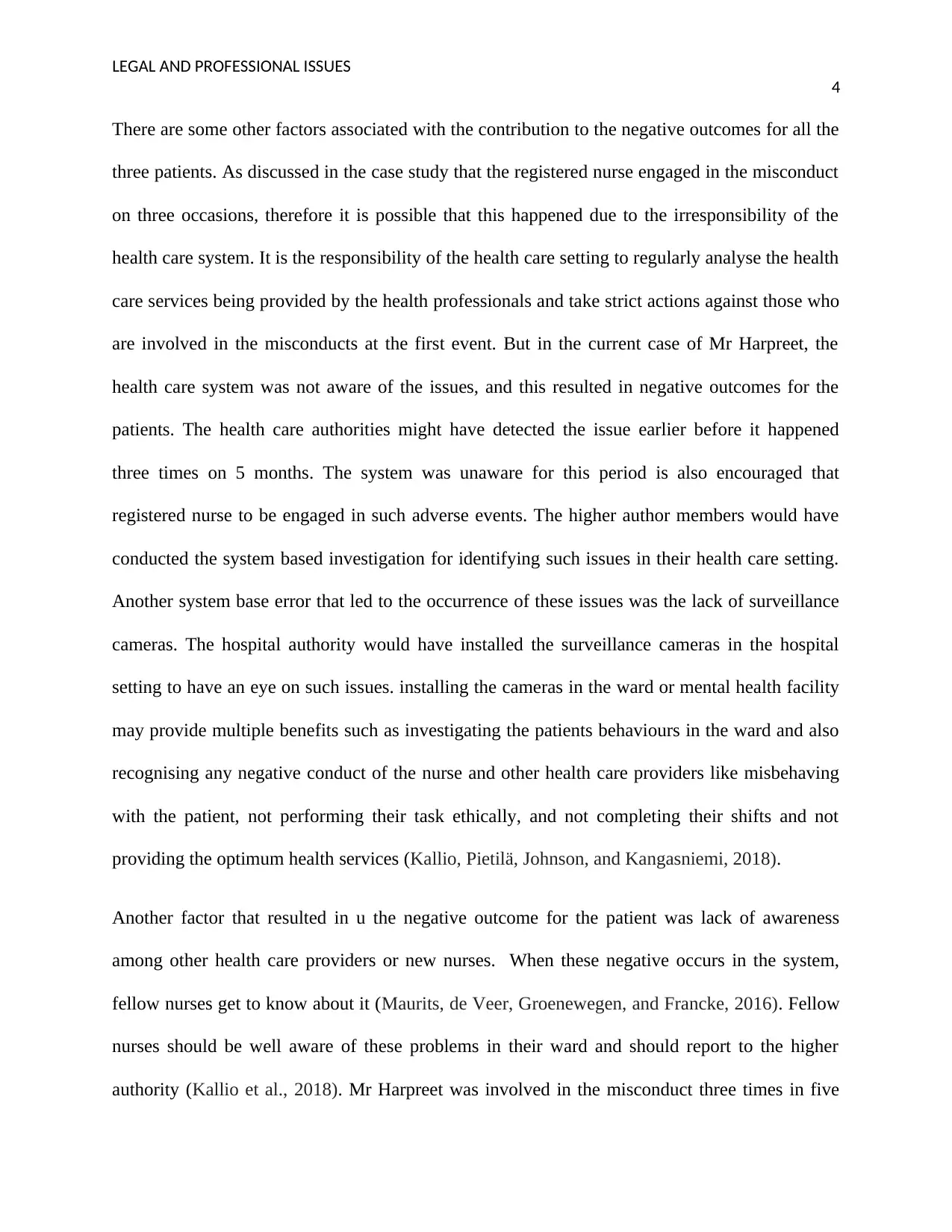
LEGAL AND PROFESSIONAL ISSUES
4
There are some other factors associated with the contribution to the negative outcomes for all the
three patients. As discussed in the case study that the registered nurse engaged in the misconduct
on three occasions, therefore it is possible that this happened due to the irresponsibility of the
health care system. It is the responsibility of the health care setting to regularly analyse the health
care services being provided by the health professionals and take strict actions against those who
are involved in the misconducts at the first event. But in the current case of Mr Harpreet, the
health care system was not aware of the issues, and this resulted in negative outcomes for the
patients. The health care authorities might have detected the issue earlier before it happened
three times on 5 months. The system was unaware for this period is also encouraged that
registered nurse to be engaged in such adverse events. The higher author members would have
conducted the system based investigation for identifying such issues in their health care setting.
Another system base error that led to the occurrence of these issues was the lack of surveillance
cameras. The hospital authority would have installed the surveillance cameras in the hospital
setting to have an eye on such issues. installing the cameras in the ward or mental health facility
may provide multiple benefits such as investigating the patients behaviours in the ward and also
recognising any negative conduct of the nurse and other health care providers like misbehaving
with the patient, not performing their task ethically, and not completing their shifts and not
providing the optimum health services (Kallio, Pietilä, Johnson, and Kangasniemi, 2018).
Another factor that resulted in u the negative outcome for the patient was lack of awareness
among other health care providers or new nurses. When these negative occurs in the system,
fellow nurses get to know about it (Maurits, de Veer, Groenewegen, and Francke, 2016). Fellow
nurses should be well aware of these problems in their ward and should report to the higher
authority (Kallio et al., 2018). Mr Harpreet was involved in the misconduct three times in five
4
There are some other factors associated with the contribution to the negative outcomes for all the
three patients. As discussed in the case study that the registered nurse engaged in the misconduct
on three occasions, therefore it is possible that this happened due to the irresponsibility of the
health care system. It is the responsibility of the health care setting to regularly analyse the health
care services being provided by the health professionals and take strict actions against those who
are involved in the misconducts at the first event. But in the current case of Mr Harpreet, the
health care system was not aware of the issues, and this resulted in negative outcomes for the
patients. The health care authorities might have detected the issue earlier before it happened
three times on 5 months. The system was unaware for this period is also encouraged that
registered nurse to be engaged in such adverse events. The higher author members would have
conducted the system based investigation for identifying such issues in their health care setting.
Another system base error that led to the occurrence of these issues was the lack of surveillance
cameras. The hospital authority would have installed the surveillance cameras in the hospital
setting to have an eye on such issues. installing the cameras in the ward or mental health facility
may provide multiple benefits such as investigating the patients behaviours in the ward and also
recognising any negative conduct of the nurse and other health care providers like misbehaving
with the patient, not performing their task ethically, and not completing their shifts and not
providing the optimum health services (Kallio, Pietilä, Johnson, and Kangasniemi, 2018).
Another factor that resulted in u the negative outcome for the patient was lack of awareness
among other health care providers or new nurses. When these negative occurs in the system,
fellow nurses get to know about it (Maurits, de Veer, Groenewegen, and Francke, 2016). Fellow
nurses should be well aware of these problems in their ward and should report to the higher
authority (Kallio et al., 2018). Mr Harpreet was involved in the misconduct three times in five
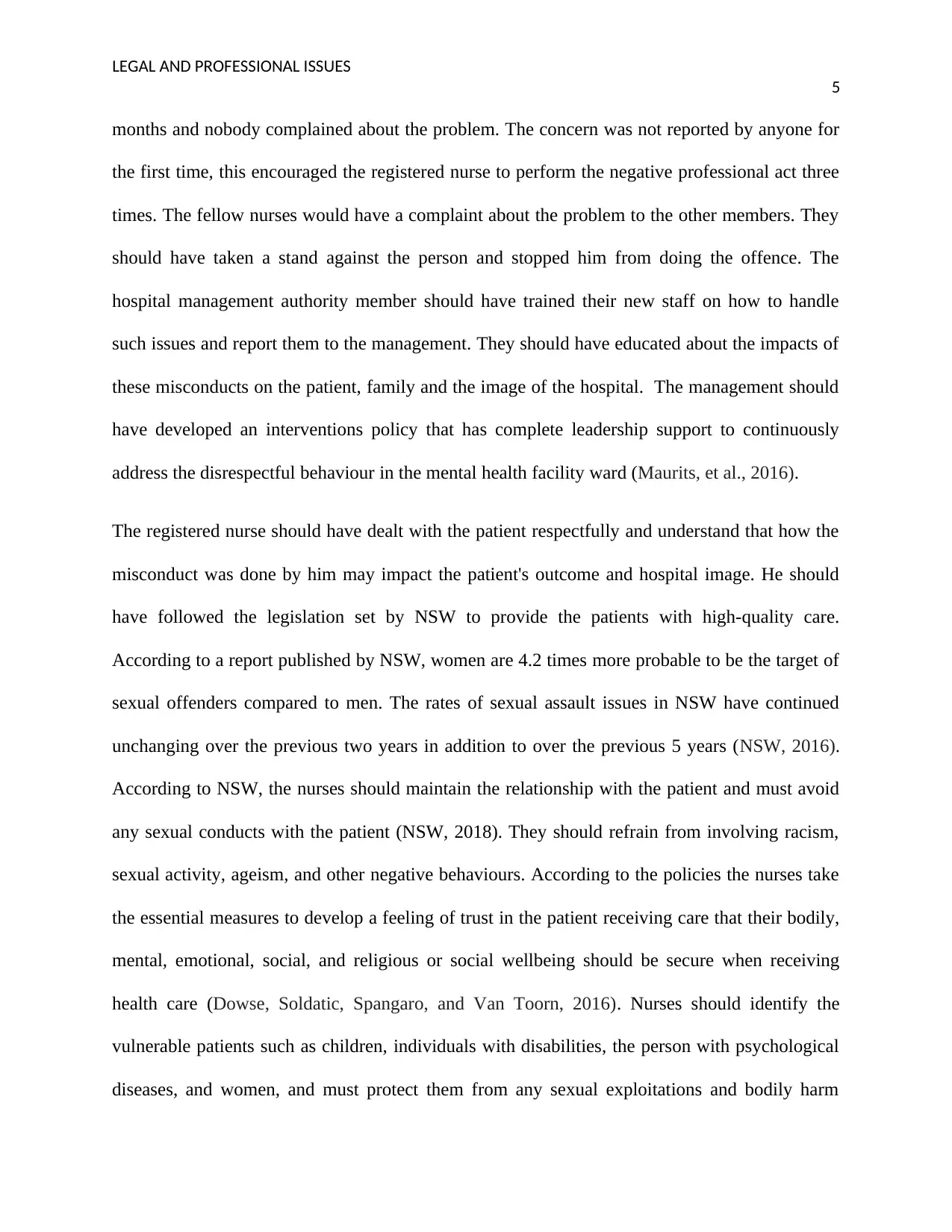
LEGAL AND PROFESSIONAL ISSUES
5
months and nobody complained about the problem. The concern was not reported by anyone for
the first time, this encouraged the registered nurse to perform the negative professional act three
times. The fellow nurses would have a complaint about the problem to the other members. They
should have taken a stand against the person and stopped him from doing the offence. The
hospital management authority member should have trained their new staff on how to handle
such issues and report them to the management. They should have educated about the impacts of
these misconducts on the patient, family and the image of the hospital. The management should
have developed an interventions policy that has complete leadership support to continuously
address the disrespectful behaviour in the mental health facility ward (Maurits, et al., 2016).
The registered nurse should have dealt with the patient respectfully and understand that how the
misconduct was done by him may impact the patient's outcome and hospital image. He should
have followed the legislation set by NSW to provide the patients with high-quality care.
According to a report published by NSW, women are 4.2 times more probable to be the target of
sexual offenders compared to men. The rates of sexual assault issues in NSW have continued
unchanging over the previous two years in addition to over the previous 5 years (NSW, 2016).
According to NSW, the nurses should maintain the relationship with the patient and must avoid
any sexual conducts with the patient (NSW, 2018). They should refrain from involving racism,
sexual activity, ageism, and other negative behaviours. According to the policies the nurses take
the essential measures to develop a feeling of trust in the patient receiving care that their bodily,
mental, emotional, social, and religious or social wellbeing should be secure when receiving
health care (Dowse, Soldatic, Spangaro, and Van Toorn, 2016). Nurses should identify the
vulnerable patients such as children, individuals with disabilities, the person with psychological
diseases, and women, and must protect them from any sexual exploitations and bodily harm
5
months and nobody complained about the problem. The concern was not reported by anyone for
the first time, this encouraged the registered nurse to perform the negative professional act three
times. The fellow nurses would have a complaint about the problem to the other members. They
should have taken a stand against the person and stopped him from doing the offence. The
hospital management authority member should have trained their new staff on how to handle
such issues and report them to the management. They should have educated about the impacts of
these misconducts on the patient, family and the image of the hospital. The management should
have developed an interventions policy that has complete leadership support to continuously
address the disrespectful behaviour in the mental health facility ward (Maurits, et al., 2016).
The registered nurse should have dealt with the patient respectfully and understand that how the
misconduct was done by him may impact the patient's outcome and hospital image. He should
have followed the legislation set by NSW to provide the patients with high-quality care.
According to a report published by NSW, women are 4.2 times more probable to be the target of
sexual offenders compared to men. The rates of sexual assault issues in NSW have continued
unchanging over the previous two years in addition to over the previous 5 years (NSW, 2016).
According to NSW, the nurses should maintain the relationship with the patient and must avoid
any sexual conducts with the patient (NSW, 2018). They should refrain from involving racism,
sexual activity, ageism, and other negative behaviours. According to the policies the nurses take
the essential measures to develop a feeling of trust in the patient receiving care that their bodily,
mental, emotional, social, and religious or social wellbeing should be secure when receiving
health care (Dowse, Soldatic, Spangaro, and Van Toorn, 2016). Nurses should identify the
vulnerable patients such as children, individuals with disabilities, the person with psychological
diseases, and women, and must protect them from any sexual exploitations and bodily harm
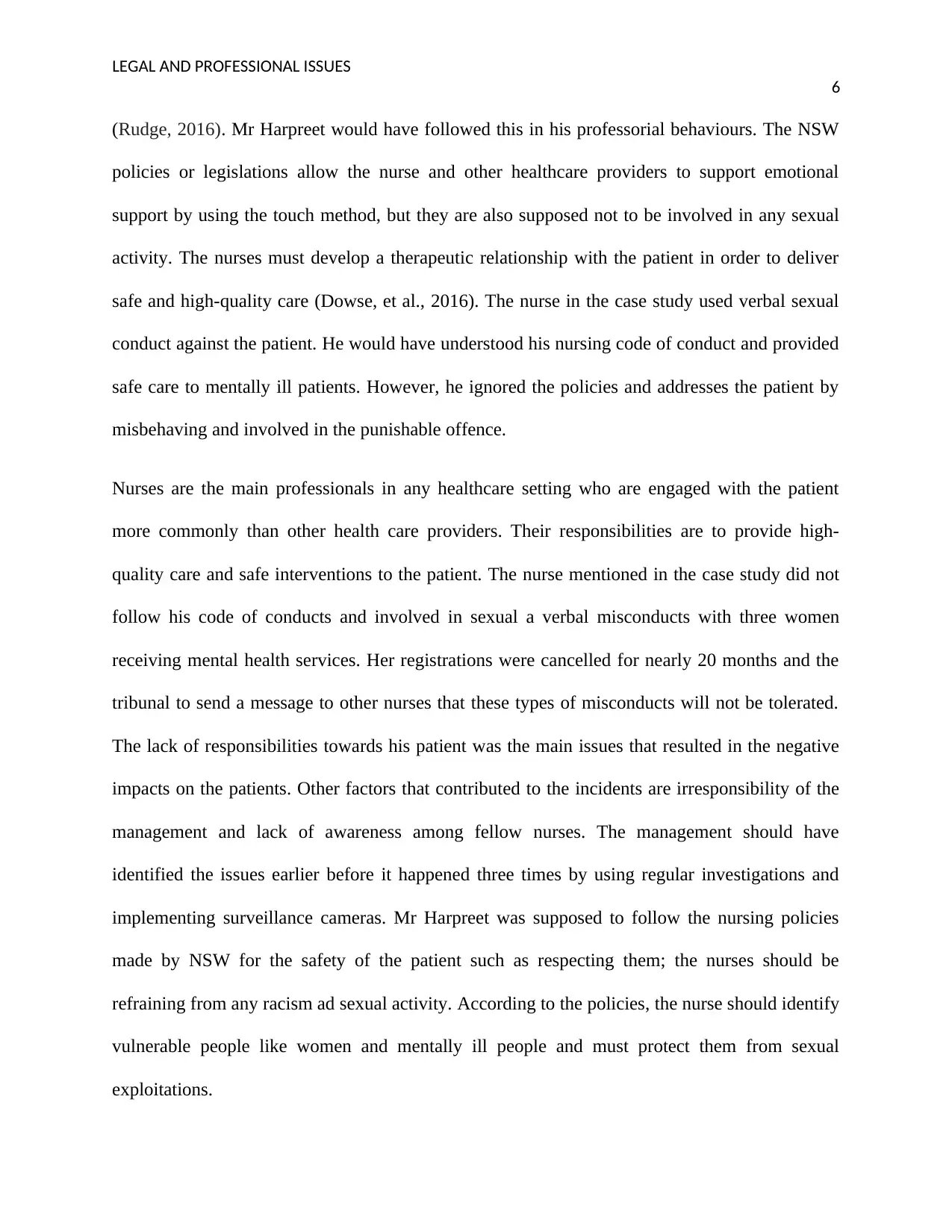
LEGAL AND PROFESSIONAL ISSUES
6
(Rudge, 2016). Mr Harpreet would have followed this in his professorial behaviours. The NSW
policies or legislations allow the nurse and other healthcare providers to support emotional
support by using the touch method, but they are also supposed not to be involved in any sexual
activity. The nurses must develop a therapeutic relationship with the patient in order to deliver
safe and high-quality care (Dowse, et al., 2016). The nurse in the case study used verbal sexual
conduct against the patient. He would have understood his nursing code of conduct and provided
safe care to mentally ill patients. However, he ignored the policies and addresses the patient by
misbehaving and involved in the punishable offence.
Nurses are the main professionals in any healthcare setting who are engaged with the patient
more commonly than other health care providers. Their responsibilities are to provide high-
quality care and safe interventions to the patient. The nurse mentioned in the case study did not
follow his code of conducts and involved in sexual a verbal misconducts with three women
receiving mental health services. Her registrations were cancelled for nearly 20 months and the
tribunal to send a message to other nurses that these types of misconducts will not be tolerated.
The lack of responsibilities towards his patient was the main issues that resulted in the negative
impacts on the patients. Other factors that contributed to the incidents are irresponsibility of the
management and lack of awareness among fellow nurses. The management should have
identified the issues earlier before it happened three times by using regular investigations and
implementing surveillance cameras. Mr Harpreet was supposed to follow the nursing policies
made by NSW for the safety of the patient such as respecting them; the nurses should be
refraining from any racism ad sexual activity. According to the policies, the nurse should identify
vulnerable people like women and mentally ill people and must protect them from sexual
exploitations.
6
(Rudge, 2016). Mr Harpreet would have followed this in his professorial behaviours. The NSW
policies or legislations allow the nurse and other healthcare providers to support emotional
support by using the touch method, but they are also supposed not to be involved in any sexual
activity. The nurses must develop a therapeutic relationship with the patient in order to deliver
safe and high-quality care (Dowse, et al., 2016). The nurse in the case study used verbal sexual
conduct against the patient. He would have understood his nursing code of conduct and provided
safe care to mentally ill patients. However, he ignored the policies and addresses the patient by
misbehaving and involved in the punishable offence.
Nurses are the main professionals in any healthcare setting who are engaged with the patient
more commonly than other health care providers. Their responsibilities are to provide high-
quality care and safe interventions to the patient. The nurse mentioned in the case study did not
follow his code of conducts and involved in sexual a verbal misconducts with three women
receiving mental health services. Her registrations were cancelled for nearly 20 months and the
tribunal to send a message to other nurses that these types of misconducts will not be tolerated.
The lack of responsibilities towards his patient was the main issues that resulted in the negative
impacts on the patients. Other factors that contributed to the incidents are irresponsibility of the
management and lack of awareness among fellow nurses. The management should have
identified the issues earlier before it happened three times by using regular investigations and
implementing surveillance cameras. Mr Harpreet was supposed to follow the nursing policies
made by NSW for the safety of the patient such as respecting them; the nurses should be
refraining from any racism ad sexual activity. According to the policies, the nurse should identify
vulnerable people like women and mentally ill people and must protect them from sexual
exploitations.
Paraphrase This Document
Need a fresh take? Get an instant paraphrase of this document with our AI Paraphraser
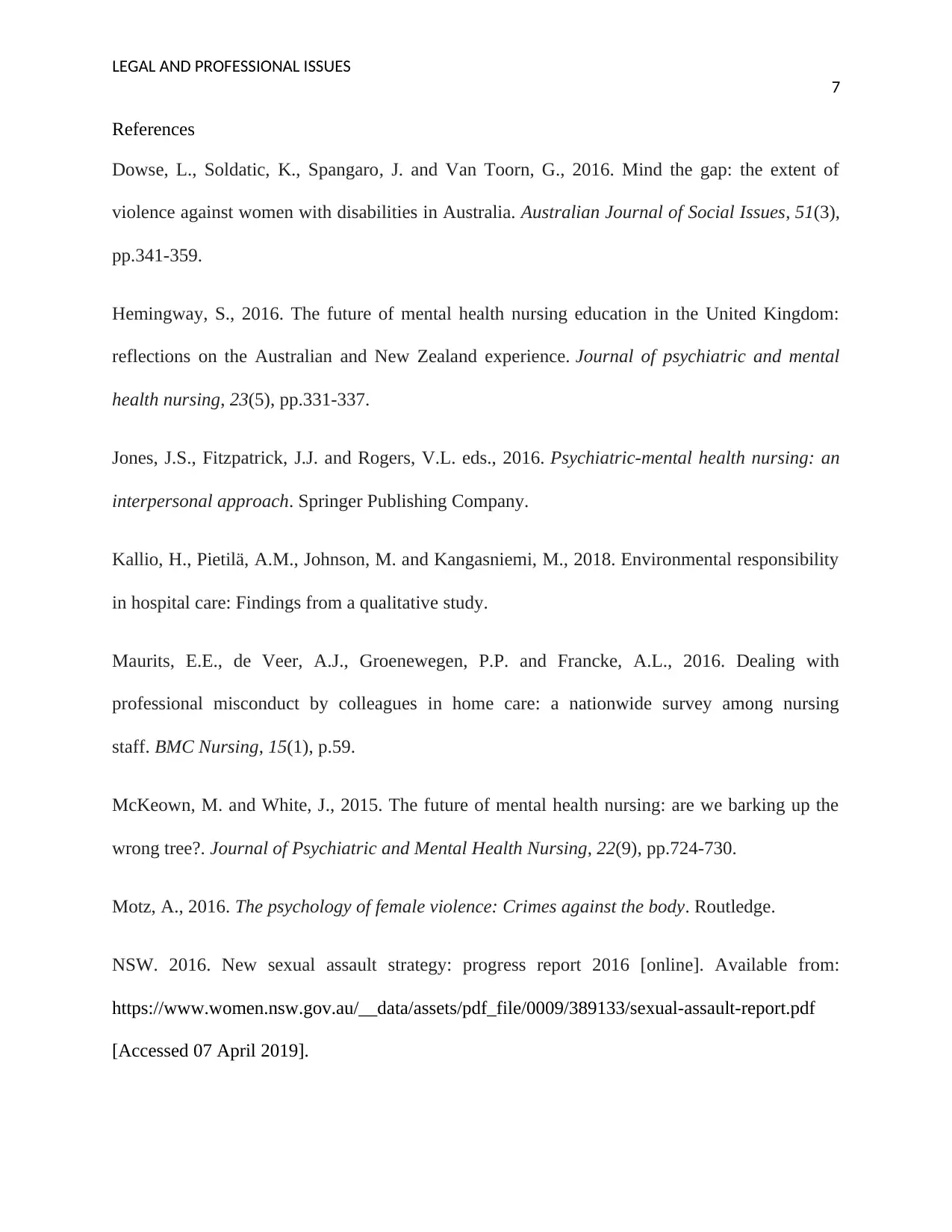
LEGAL AND PROFESSIONAL ISSUES
7
References
Dowse, L., Soldatic, K., Spangaro, J. and Van Toorn, G., 2016. Mind the gap: the extent of
violence against women with disabilities in Australia. Australian Journal of Social Issues, 51(3),
pp.341-359.
Hemingway, S., 2016. The future of mental health nursing education in the United Kingdom:
reflections on the Australian and New Zealand experience. Journal of psychiatric and mental
health nursing, 23(5), pp.331-337.
Jones, J.S., Fitzpatrick, J.J. and Rogers, V.L. eds., 2016. Psychiatric-mental health nursing: an
interpersonal approach. Springer Publishing Company.
Kallio, H., Pietilä, A.M., Johnson, M. and Kangasniemi, M., 2018. Environmental responsibility
in hospital care: Findings from a qualitative study.
Maurits, E.E., de Veer, A.J., Groenewegen, P.P. and Francke, A.L., 2016. Dealing with
professional misconduct by colleagues in home care: a nationwide survey among nursing
staff. BMC Nursing, 15(1), p.59.
McKeown, M. and White, J., 2015. The future of mental health nursing: are we barking up the
wrong tree?. Journal of Psychiatric and Mental Health Nursing, 22(9), pp.724-730.
Motz, A., 2016. The psychology of female violence: Crimes against the body. Routledge.
NSW. 2016. New sexual assault strategy: progress report 2016 [online]. Available from:
https://www.women.nsw.gov.au/__data/assets/pdf_file/0009/389133/sexual-assault-report.pdf
[Accessed 07 April 2019].
7
References
Dowse, L., Soldatic, K., Spangaro, J. and Van Toorn, G., 2016. Mind the gap: the extent of
violence against women with disabilities in Australia. Australian Journal of Social Issues, 51(3),
pp.341-359.
Hemingway, S., 2016. The future of mental health nursing education in the United Kingdom:
reflections on the Australian and New Zealand experience. Journal of psychiatric and mental
health nursing, 23(5), pp.331-337.
Jones, J.S., Fitzpatrick, J.J. and Rogers, V.L. eds., 2016. Psychiatric-mental health nursing: an
interpersonal approach. Springer Publishing Company.
Kallio, H., Pietilä, A.M., Johnson, M. and Kangasniemi, M., 2018. Environmental responsibility
in hospital care: Findings from a qualitative study.
Maurits, E.E., de Veer, A.J., Groenewegen, P.P. and Francke, A.L., 2016. Dealing with
professional misconduct by colleagues in home care: a nationwide survey among nursing
staff. BMC Nursing, 15(1), p.59.
McKeown, M. and White, J., 2015. The future of mental health nursing: are we barking up the
wrong tree?. Journal of Psychiatric and Mental Health Nursing, 22(9), pp.724-730.
Motz, A., 2016. The psychology of female violence: Crimes against the body. Routledge.
NSW. 2016. New sexual assault strategy: progress report 2016 [online]. Available from:
https://www.women.nsw.gov.au/__data/assets/pdf_file/0009/389133/sexual-assault-report.pdf
[Accessed 07 April 2019].
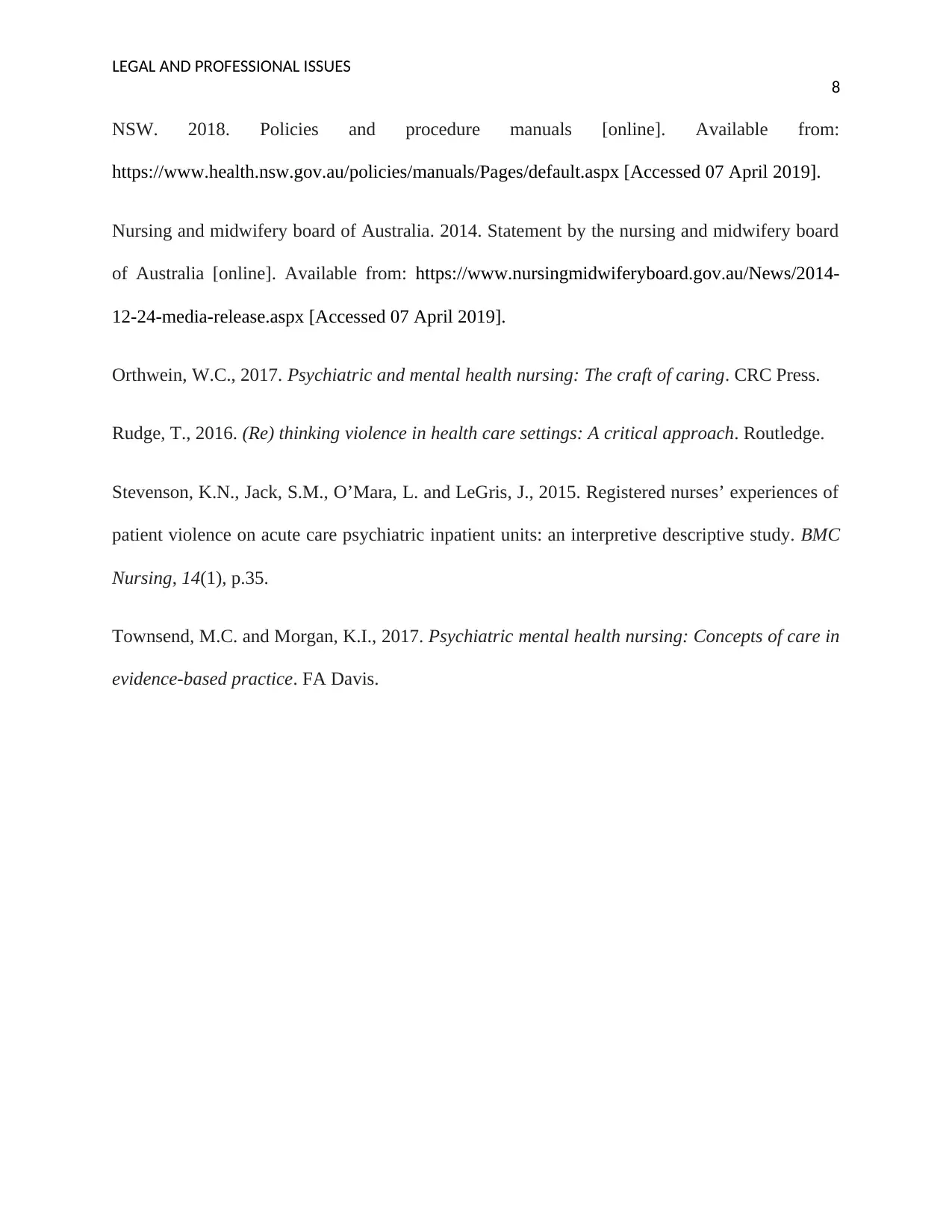
LEGAL AND PROFESSIONAL ISSUES
8
NSW. 2018. Policies and procedure manuals [online]. Available from:
https://www.health.nsw.gov.au/policies/manuals/Pages/default.aspx [Accessed 07 April 2019].
Nursing and midwifery board of Australia. 2014. Statement by the nursing and midwifery board
of Australia [online]. Available from: https://www.nursingmidwiferyboard.gov.au/News/2014-
12-24-media-release.aspx [Accessed 07 April 2019].
Orthwein, W.C., 2017. Psychiatric and mental health nursing: The craft of caring. CRC Press.
Rudge, T., 2016. (Re) thinking violence in health care settings: A critical approach. Routledge.
Stevenson, K.N., Jack, S.M., O’Mara, L. and LeGris, J., 2015. Registered nurses’ experiences of
patient violence on acute care psychiatric inpatient units: an interpretive descriptive study. BMC
Nursing, 14(1), p.35.
Townsend, M.C. and Morgan, K.I., 2017. Psychiatric mental health nursing: Concepts of care in
evidence-based practice. FA Davis.
8
NSW. 2018. Policies and procedure manuals [online]. Available from:
https://www.health.nsw.gov.au/policies/manuals/Pages/default.aspx [Accessed 07 April 2019].
Nursing and midwifery board of Australia. 2014. Statement by the nursing and midwifery board
of Australia [online]. Available from: https://www.nursingmidwiferyboard.gov.au/News/2014-
12-24-media-release.aspx [Accessed 07 April 2019].
Orthwein, W.C., 2017. Psychiatric and mental health nursing: The craft of caring. CRC Press.
Rudge, T., 2016. (Re) thinking violence in health care settings: A critical approach. Routledge.
Stevenson, K.N., Jack, S.M., O’Mara, L. and LeGris, J., 2015. Registered nurses’ experiences of
patient violence on acute care psychiatric inpatient units: an interpretive descriptive study. BMC
Nursing, 14(1), p.35.
Townsend, M.C. and Morgan, K.I., 2017. Psychiatric mental health nursing: Concepts of care in
evidence-based practice. FA Davis.
1 out of 9
Related Documents
Your All-in-One AI-Powered Toolkit for Academic Success.
+13062052269
info@desklib.com
Available 24*7 on WhatsApp / Email
![[object Object]](/_next/static/media/star-bottom.7253800d.svg)
Unlock your academic potential
© 2024 | Zucol Services PVT LTD | All rights reserved.





